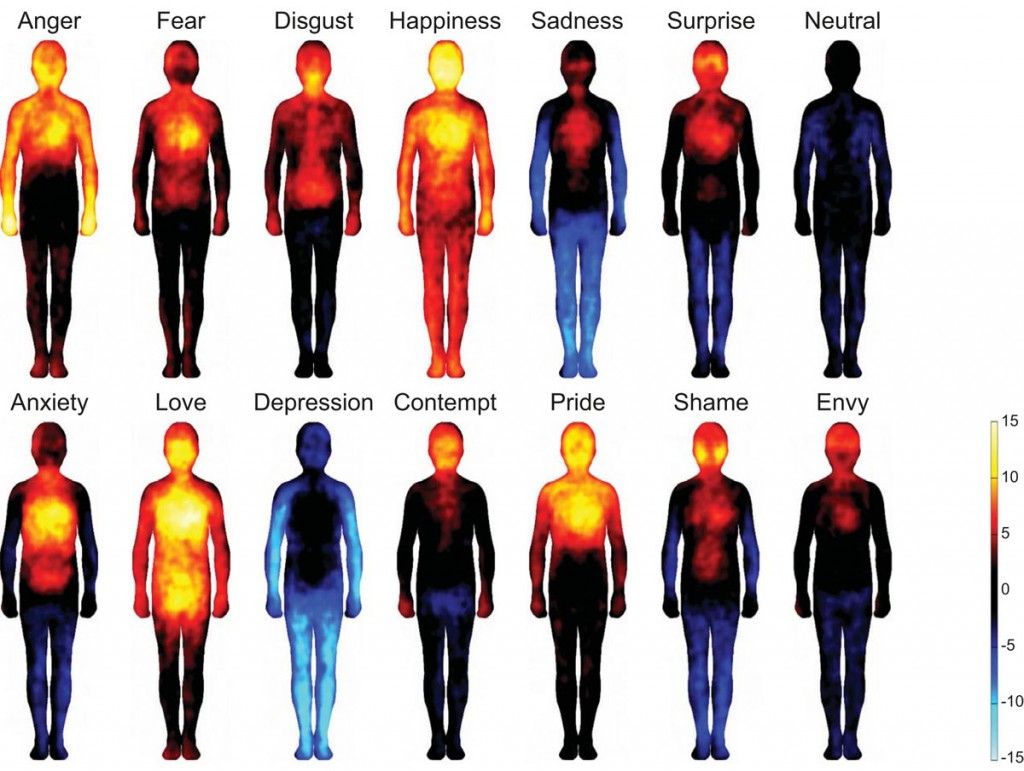Our technologies are rapidly evolving, and with it, the very nature of our personal lives. Here’s how the era of tech-enabled intimacy will forever change the way we go about forming and maintaining relationships.
One person who’s given this topic considerable thought is Heather Schlegel. She’s an award winning futurist and social scientist who investigates changes in technology, culture, transactions and money, relationships, and intimacy. I contacted Schlegel to get her take on the future of human intimacy and the role that technology will play.
During our conversation, we talked about the power of social networks, the potential for embedded sensors to track and record our psychological experiences, a twitter for emotions, and the future of sex. We also considered alternative relationships, like the one portrayed in Spike Jonze’s Her, and the use of psychopharmaceuticals for therapeutic purposes. It became clear from our chat that the future of human intimacy is set to undergo some fairly radical changes.
Gizmodo/io9: A common complaint heard today is that our technologies are diminishing and demeaning the quality of human interaction. We’re constantly told that our gadgets are creating superficial and impersonal levels of engagement. You don’t believe this. Why?
Schlegel: Several years ago, I might have agreed with the idea that technology is driving us apart. But I changed my opinion when I realised that technology, particularly social networking and mobile devices, was helping me have deeper relationships.

I call this The Global Now — a geo-temporal awareness created through shared friend-node experiences, like SMS’s, status updates, tweets, and instagrams. This allows me to peer through a window and into the lives of my friends, colleagues — even total strangers. I wasn’t necessarily seeking a deeper connection, but because we shared close details of our lives, a familiarity developed. (Image: Anton Balazh/Shutterstock)
Yes, it was technology that facilitated this familiarity, but it was the humans who decided what to share — and how vulnerable and open to be.
People can choose to use technology to drive a wedge between human to human contact. You can just as easily use text messaging to increase intimacy and familiarity as to avoid it.
Why do we need technologies that improve or enhance human intimacy? Are we trying to fix something that ain’t broke?
Intimacy is not just about taking off your clothes and getting sexual. You can have sexual experiences that are not intimate. My colleagues and I defined intimacy to include vulnerability and empathy.
I don’t know about you, but I think more human empathy is a good thing. It leads to understanding, compassion and tolerance — and the world can use a lot more that.
You’ve talked about the potential for embedded body sensors that could someday allow humans to share snapshots of their emotional states and foster deeper levels of intimacy.
Wearable health tracking devices (Misfit, Nike Fuelband) are accepted and we already have embeddable medical devices to track and monitor specific biological data. With materials advancements we have proof of concepts for wearable sensors and flexible electronics. It doesn’t take that big of a leap to see embedded technology.
This is to say, the hardware to connect our body-hardware to technology-hardware is being developed fast. We’ll get there sooner rather than later.
However there’s a lot of work to be done on the human “software” side. While we have a good understanding of the hardware of the brain — how it works chemically — we have less of an understanding of the software or operating systems we use. By that, I mean, how we individually parse and perceive the world. I don’t make the grand assumption we all experience the world the same way. Neurodiversity is an expanding discipline.

We will need to develop a language of emotions and a further language of intimacy. There was a great image — a heat map of emotions going around a few months ago. From a body perspective we can see where we “feel” these emotions. But in what intensity? And who is to say that I feel happiness the same way you do. Or love. Or fear. Or anger? We don’t have a baseline emotional alphabet. At least not yet. This baseline emotional alphabet is a prerequisite for emotion-to-emotion communication. What we’re talking about is a syntax of emotion.
How could these body sensors revolutionise relationships?
Once we establish a baseline language, I can imagine some pretty far out scenarios, new jobs, experiences, and relationship possibilities. Consider how a painter uses colours, or a poet uses words. An artist might use emotional “language” to “paint” emotional experiences.
When it comes to relationships, a language of emotions could make it easier for us to understand and communicate our internal states. This facilitates deeper bonds, whether those be platonic or romantic. An increasing number of relationships are not following traditional paths. Marriage is declining and there seems to be an increasing number of complex multi-partner relationships/family structures. Navigating these complex family structures can be made easier with clearer communication. The same situations can occur in the workplace, like when you’re working closely with another person, pair programming, or in a small war room team.
When you apply this idea to AI it gets really interesting. We’ve got a great understanding of logic. But emotions? Too messy. At some point, for AI to evolve, they will have to have an emotional understanding. And not just a programmed emotional understanding. Transhumanism and human singularity miss a huge piece of the puzzle without this emotional understanding. Our HCI devices in the future (if they are devices) may have emotional interfaces or custom interfaces based on neurodiversity. Let’s hope it doesn’t become like THX-1138 though.
Could these devices also improve sex between couples?
Absolutely. If you want to deeply connect with someone on an emotional level while having sex an EMP-Connect or IN-LINE could do this. But I don’t assume everyone wants this deep emotional sex all the time. Sometimes you just want it down and dirty, you know. Or maybe with a mindless sexbot programmed with your particular emotional details. It could also be used to help people work through sexual trauma or issues, if they’re unable to be with a partner.

There’s a great movie that tells a similar story, Lars and the Real Girl. This could be a fantastic tool for sexual surrogates and sex therapy.
What do you mean by a “Twitter for emotions?”
My colleagues and I designed EMP-Connect as an embedded biopatch to broadcast emotional snapshots much like Twitter enables you to share snapshots of text and Instagram snapshots of images or video.
Imagine you are walking on a beach, feeling calm, peaceful and connected to the world. You want to take a “snapshot” of that experience and share it with a friend, or your mum, or maybe you want to revisit it later (for example, during a 14 hour work day). Maybe you want to take a “snapshot” when you’re in a deep meditative space to share with others what it feels like to have a deep sense of calm and peace. Maybe you want to take a snapshot at the protest rally, when a cop beats you. Or you are sexually harassed. So that others (perhaps even a convicted offender) can feel it.

One example I like is a child going into surgery. Their parents can’t accompany them into the surgery room. But with EMP-Connect, the parent could be there with their reassurances from afar. (image: carlos castilla/Shutterstock)
Our team came up with a unique punishment for offenders — to relive the crime from the victim’s perspective as part of the punishment.
Is possible to scale intimacy? Can we have too much of a good thing?
I’m certain this won’t appeal to everyone. Like any new technology, self-selected early adopters will embrace it before it enters the mainstream. I’m still discovering what it means to scale intimacy. Does this technology increase my capacity for intimacy? Am I able to increase the number of people I have deep connections with? Does that make my life more fulfilling?
For me, the answer is yes. It’s a natural extension of my early “naked blogging” days while allowed me to have deep connections with people I never met.
The Spike Jonze film, Her, depicts a relationship between a human and an artificial intelligence. What are your thoughts on such an arrangement?
I loved the movie Her. I was drawn to the idea of having a relationship with an AI that learns about you and adapts to you. Talk about the perfect “man/woman!”

We have variety of relationships with people. Even “friendship” has many nuances. Are you Facebook friends? BFFs? Friends with Benefits? I have many friends and they don’t all fit into the same category. We have relationships with our pets. Some people even have relationships with their cars. Why is it so weird to think we have relationships with our devices? They are extensions of ourselves. They facilitate and mediate lots of relationships for us.
Relationships teach us as much about ourselves as anything. If there’s the possibility of learning more about ourselves having a relationship with an AI or our devices, I see that as a good thing. Her was about Theodore’s growth. He needed to get over his previous relationship and work through the grief and learn to trust again. Samantha was a mirror in which he was reflected. At the end, he is delivered back into the world of human interaction with a renewed set of personal interaction skills. It’s not unlike Lars and the Real Girl.
How do you feel about neurochemical methods to improve intimacy and relationships?
It depends on why you’re using it. As a band-aid, it would be pushing out the end-date. But if it was used to help someone get through a rough patch, I can see a benefit. It’s hard enough to have a loving long term relationships in our modern world. Conscious long standing relationships have many benefits.
If you’re interested in learning more, check out Heather’s SxSW presentation on the New Age of Technology Enhanced Intimacy, this podcast which explores “the third space,” bonded experiences with technology and emotional snapshots, and this conversation about the right relationship with technology.
Follow me on Twitter: @dvorsky
